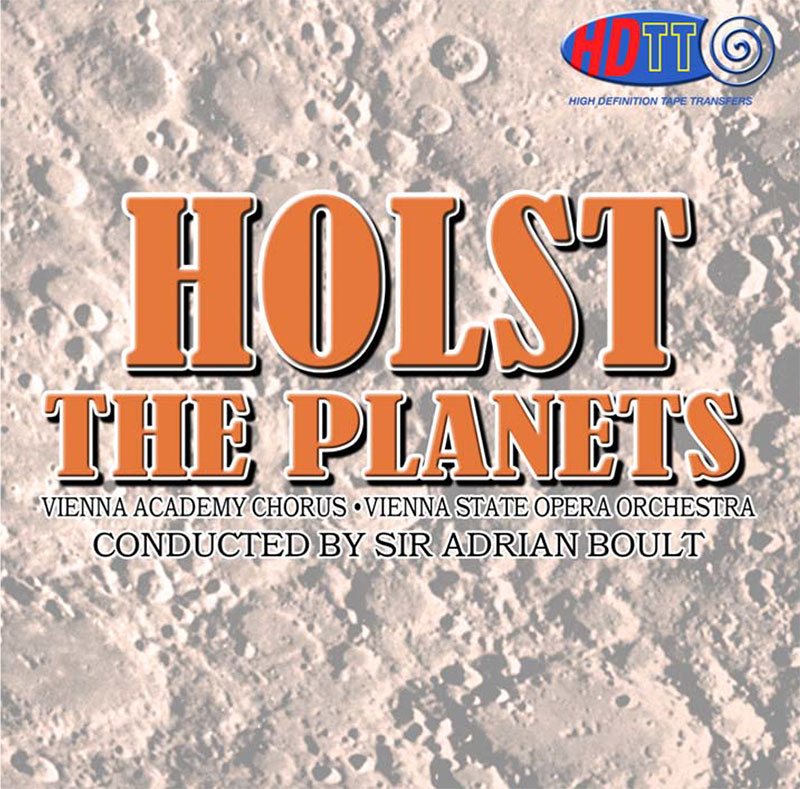Logowanie
Dziś nikt już tak genialnie nie jazzuje!
Bobby Hutcherson, Joe Sample
San Francisco
SHM-CD/SACD - NOWY FORMAT - DŻWIĘK TAK CZYSTY, JAK Z CZASU WIELKIEGO WYBUCHU!
Wayne Shorter, Freddie Hubbard, Herbie Hancock, Ron Carter, Elvin Jones
Speak no evil
UHQCD - dotknij Oryginału - MQA (Master Quality Authenticated)
Chesky! Niezmiennie perfekcyjny
Winylowy niezbędnik
ClearAudio
Double Matrix Professional - Sonic
najbardziej inteligentna i skuteczna pralka do płyt winylowych wszelkiego typu - całkowicie automatyczna
HOLST, Vienna Symphony Orchestra, Sir Adrian Boult
THE PLANETS
- 1. Mars, the Bringer of War 7:11
2. Venus, the Bringer of Peace 8:32
3. Mercury, the Winged Messenger 3:59
4. Jupiter, the Bringer of Jollity 8:24
5. Saturn, the Bringer of Old Age 8:18
6. Uranus, the Magician 6:22
7. Neptune, the Mystic 6:19
- Vienna Symphony Orchestra - orchestra
- Sir Adrian Boult - conductor
- HOLST
GUSTAV HOLST THE PLANETS
The concept of the work is astrological rather than astronomical (which is why Earth is not
included). The idea was suggested to Holst by Cli ord Bax, who introduced him to astrology
when the two were amongst a small group of English artists holidaying in Majorca in the spring
of 1913; Holst became quite a devotee of the subject, and liked to cast friends' horoscopes for
fun. Each movement is intended to convey ideas and emotions associated with the human
psyche, not the Roman deities. Holst also used Alan Leo's]book What is a Horoscope? as a
springboard for his own ideas, as well as for the subtitles (i.e., "The Bringer of...") for the
movements.
The Planets as a work in progress was originally scored for a piano duet, except for "Neptune,"
which was scored for a single organ, as Holst believed that the sound of the piano was too harsh
for a world as mysterious and distant as Neptune. Holst then scored the suite for a large
orchestra and it was in this incarnation that it became enormously popular. Holst's use of
orchestration was very imaginative and colourful, showing the in uence of Schoenberg, and
other continental composers of the day rather than his English predecessors. The in uence of
Igor Stravinsky's The Firebird, Petrushka, and The Rite of Spring is especially notable. These new
(at least for British audiences) sonorities helped make the suite an instant success. Although The
Planets remains Holst's most popular work, the composer himself did not count it among his
best creations and later in life complained that its popularity had completely eclipsed his other
works. He did, however, conduct a recorded performance of the suite in the early 1920s, and he
was partial to his own favourite movement, "Saturn".
During the last weeks of World War I, the hastily-rehearsed (the musicians rst saw the
complicated music only two hours before the performance) private orchestral premiere of The
Planets suite was held at rather short notice on September 29, 1918 in the Royal Albert Hall.
Despite this auspicious venue, it was a comparably intimate a air, attended by around 250
associates, with a chamber orchestra and choir conducted by Boult at the request of his
friendsHolst, and nancial backer and fellow composer Balfour Gardiner. An ecstaticallyreceived
public concert was given a few weeks later while Holst was overseas, but out of the
seven movements, only ve were played. After the war, the rst complete public performance
occurred on October 10, 1920, in Birmingham.
Sir Adrian Cedric Boult (April 8, 1889 February 22, 1983)
Boult was born in Chester and educated at Westminster School and Christ Church,
Oxford. As a schoolboy, he was introduced to the world of music by a family friend,
Frank Schuster, who was a friend of Edward Elgar and introduced the young Boult
to the composer around 1905.
He completed his musical education at the Leipzig Conservatory where he learnt to
conduct by watching the eminent Hungarian conductor Arthur Nikisch. He sang in
choral festivals and at the Leeds Festival of 1913, where he went to watch Nikisch
conduct, and made the acquaintance of George Butterworth and other British
composers.
During World War I he was employed at the War O ce, and whilst there in 1918
planned a series of concerts with the London
Symphony Orchestra, which included several
important recent British works: Gustav Holst's
The Planets, of which he gave the rst private
performance, A London Symphony by Ralph
Vaughan Williams, of which he gave the rst
performance of the revised version, and Elgar's
Symphony No. 2 which had fallen into neglect.
Elgar wrote to him and said he felt sure the
future of his music was safe in Boult's hands. In
this way Boult laid the foundations for a long
career as a champion of twentieth century
English music. As one example, Vaughan
Williams dedicated Job, A Masque for Dancing
to Boult in the mid-1930s, several years after the
actual premi?re of the work.































